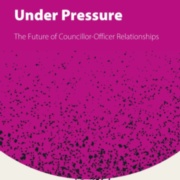Under Pressure: The Future of Councillor-Officer Relationships
The traditional role of political leaders setting direction and policy, with senior local government officers presenting the operational solutions to implementation, has, in many cases, transformed into much more nuanced, and on occasions, strained relationships. Whilst there remains an overriding respect for each other’s roles, the confines of resource limitations, and regulatory duties, which govern how that political vision can be turned into a legitimate reality, can test the parameters of this traditional arrangement.
Studies in this field are therefore vital; exploring these relationships which influence decision-making, the implementation of policies, and how well local government delivers for its citizens. This research was carried out by a team from Staffordshire University, Birmingham University, Essex University, Leeds Beckett University and the University of Urbino Carlo Bo. It draws on the results of a Q-method study design to map and analyse different viewpoints on a particular issue, as well as conversations with councillors and officers from across local government, notably through two detailed case studies: Swansea and Lancaster Councils.


.png)



.png)